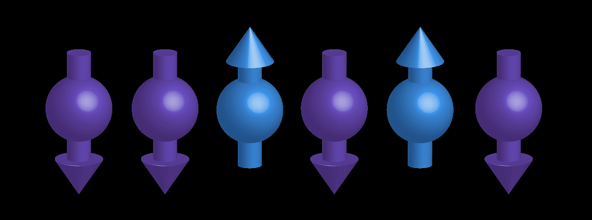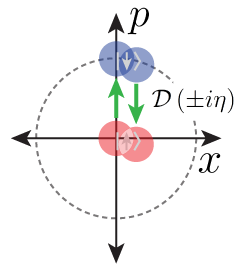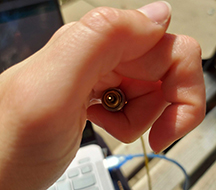Welcome to Wes Campbell's Reseach Group at UCLA Physics & Astronomy
 Our research uses ultra-cold atoms and molecules to learn about the physical processes that permeate our world.
Our research uses ultra-cold atoms and molecules to learn about the physical processes that permeate our world.
We are specifically focused on the physics of quantum information, which includes advanced sensing, simulation, and computing applications.
We use gas and liquid phase atoms and molecules as tiny computers to perform tasks that cannot be simulated on classical computers. Our approach is to focus on novel species and novel ways to control them to leverage the built-in "quantumness" of these molecules for higher performance in these applications.
Latest News
 Matter-wave Interferometry
Matter-wave Interferometry
March 30, 2024: One of the strange features of quantum mechanics is that it predicts how particles can behave like waves, which means they exhibit interference. A recently-published article describes how matter wave interferometry with a single trapped ion can be used to verify entanglement between the motion of the atom and its spin. The atom is split into two wavepackets (one for each spin state) that are separated (thereby erasing the spin coherence) and then recombined (reviving the spin coherence). Since the timescale of the entalging operation, about 16 picoseconds, is much shorter than the spin precession time, about 1 ns, this ``ultrafast'' entangling operation lays the groundwork for quantum gates with trapped ions that are orders of magnitude faster than the standard scheme.
 ``Cooling by
heating''
``Cooling by
heating''
March 6, 2024: Laser cooling of an atom is
typically performed with narrow-linewidth laser light that
represents a highly-ordered (i.e. ``cold'') state of the
electromatnetic field. It may be tempting to ascribe the
resulting low atomic temperature to some sort of equilibrium
between the atom's state and this low-entropy state of the
electromagnetic field. In a new paper, we describe how the narrow-linewidth
part of the laser-cooling process can be separated from the
step that drives entropy removal, which illustrates that
even a hot, thermal state of the electromagnetic field (such
as sunlight) can
be used to cool the atom by coupling it to near-vacuum modes.
 Quantum
Origami
Quantum
Origami
February 2024: More than just a great
name for a death metal band, a Weyl chamber ("vile chamber") can be
defined that contains all two-qubit gates, with those that cannot be
made equivalent through one-qubit gates at unique points.
In preparation for the
upcoming Winter
School on QIS for Chemistry, you can make your own
origami Weyl
chamber here
(print single-sided). Wes gives special thanks to Gavin E.
Crooks
and Birgitta
Whaley for inspiring the idea.
 Amanda Younes named
Optica Women Scholar
Amanda Younes named
Optica Women Scholar
April 3, 2023: Optica
(formerly OSA) has announced the 20 Optica Women Scholars
for 2023, and undergraduate Amanda Youness is among the
winners. Congratulations, Amanda!
